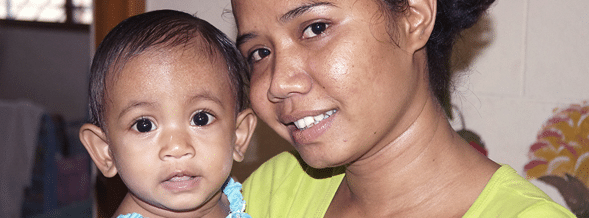Help our local partners realise their vision of hope for their communities

Timor-Leste sought independence in 2002 after centuries of Portuguese colonial rule, followed by Indonesian occupation and years of conflict which left most of the country displaced and 70% of the infrastructure decimated. In recent years however, the young country has witnessed its third free and fair Presidential and Parliamentary election and inaugurated the new government in August 2012. Emerging after decades of conflict the nation has since made great progress toward securing lasting peace and stability over the last 16 years. However, the nation of 1.3 million people continues to face challenges. The World Bank published an Economic Report on Timor-Leste in April 2019, it outlined that GDP has steadily declined for the second consecutive year due to political and economic uncertainty. Malnutrition has also been a continuous issue from the country’s conception; ranking 3rd highest for child malnourishment and stunting in the world.
42% of the population in Timor-Leste currently lives below the national poverty line. Unemployment is high, employment opportunities in the formal sector are generally limited and job creation by the private sector falls far short of demand. Leaving most of the population with no consistent earnings and many as subsistence farmers. Timor-Leste is a patriarchal society in which social norms and values largely shape gender roles. Men are expected to be responsible for decision making in the household and tend to be the main income earners. In regards to rural households, women share the role of providing for their families through agriculture, fishing and raising livestock. Male authority is then re-affirmed through cultural and religious values. As a result of this, such practises can be seen to perpetuate gender inequality. The majority of the population are followers of Catholicism, which also plays a role in shaping social norms and contributed to the conservative attitudes about gender roles and reproductive health, including the use of contraceptive methods.

As it stands, the main issues for women are as follows, poverty, domestic violence and lack of recognition of women’s contribution both on a political and economic level. Political participation and economic empowerment play a major role as years of conflict left nearly half of the Timorese women widowed and sole providers for their family. Although there are more women in the labour market than ever before, gender inequality is still a prevalent issue, with women systematically denied the same work rights as men. Sexual violence, unequal divisions of unpaid care and domestic work, and discrimination in public office all remain critical issues for women. Climate change and disasters continue to have a disproportionate effect on women and children, as do conflict and migration.
The young nation has a high rate of domestic and gender based violence. Violence against young women and girls is widespread and is one of the biggest challenges the young nation faces. According to the 2016 Nabilan Baseline Study by The Asia Foundation, a total of 59% of women between the ages of 15-49 in relationships have suffered from physical or sexual violence at the hands of a male partner. Domestic violence against women is a prevalent issue; with three quarters of women having experienced severe, as opposed to moderate acts of violence. As well as 81% of women suffering from domestic violence who experience the violence frequently. Alongside intimate partner violence, the report showed that 14% of all women between 15-49 years old had been raped by a non-partner in their lifetime. This non-partner sexual violence is most likely perpetrated by family members, strangers and men from the neighbourhood. The Demographic and Health Survey (2009-2010) DHS report highlighted that an astounding 86% of women and 81% of men believe that it is justifiable for a husband to hit his wife under certain circumstances. It showed that more than a third (38%) of women have experienced physical violence during their adult lives. Only 3% of women who sought help after suffering from domestic violence reported it to the Police. Two out of three women who suffer from domestic violence do not tell anyone. Gender-based violence is a major issue exasperated by traditional views on marriage and gender roles. Cases of domestic violence are typically resolved at the family level and only escalated to community, religious and state authorities if solutions are not found.
Achieving gender equality is a long process and progress is slow and gradual. An important achievement is that the Timorese government has identified gender equality among its priorities. Frameworks have been put in place through parliamentary representation, legislation, national women’s machinery and coordination mechanisms. The challenges now lie in their effective implementation. Disparities between men and women remain significant and with the young nation hopeful for change, the vision for the country’s future is hell-bent on equal participation of women and men. It is crucial that gender be considered and involved in every initiative that aims to improve the lives of the Timorese people.
https://www.unwomen.org/en/get-involved/step-it-up/commitments/timor-leste
https://www.undp.org/content/dam/timorleste/docs/reports/HDR/2018NHDR/TL-NHDR-2018.web.pdf
https://www.adb.org/countries/timor-leste/poverty
https://www.undp.org/content/dam/timorleste/docs/reports/HDR/2018NHDR/TL-NHDR-2018.web.pdf